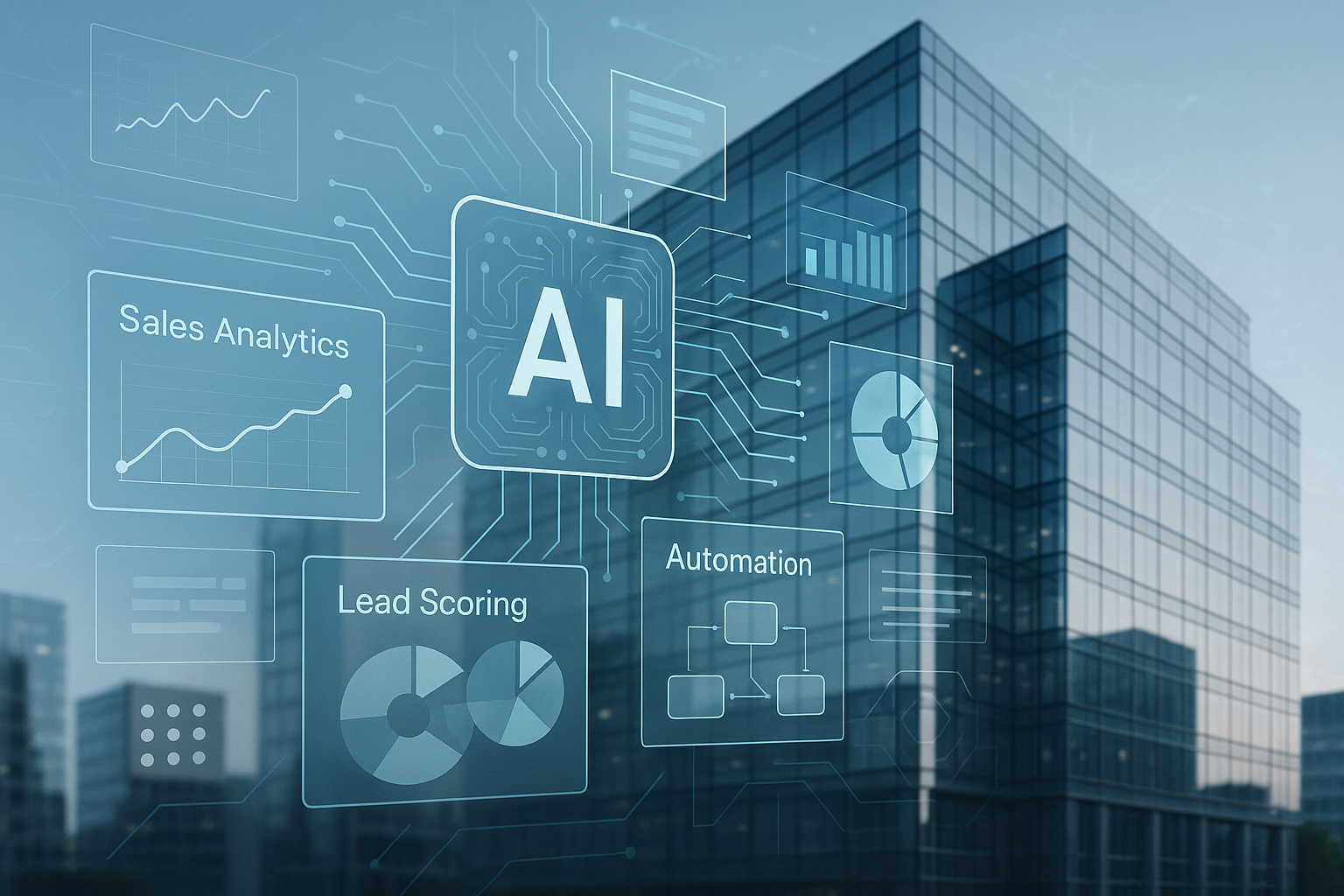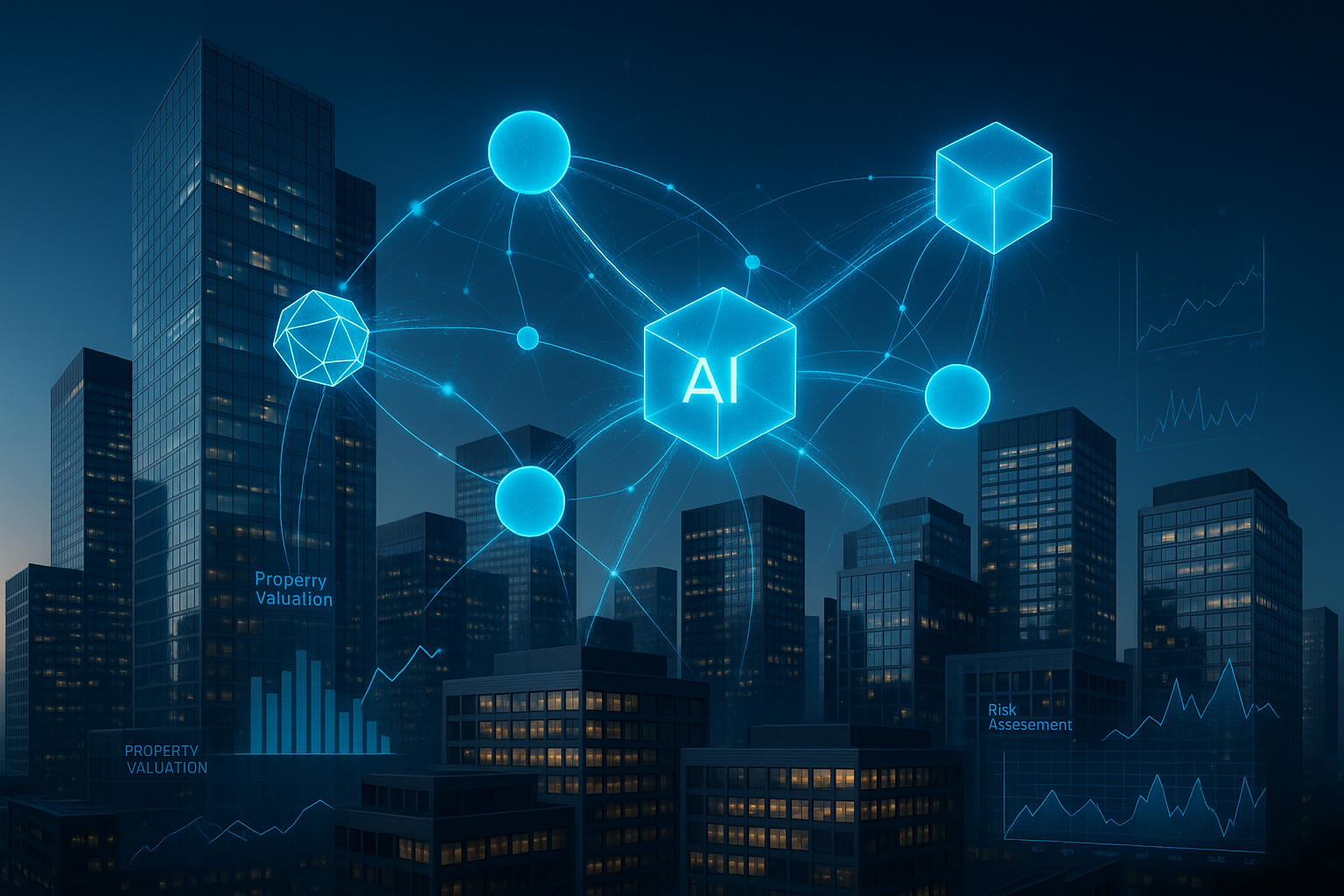
How AI Multi-Agent Platforms Are Revolutionizing Commercial Real Estate Operations
Caiyman.ai Research Team
AI Solutions Architect
The commercial real estate industry is experiencing its most significant technological transformation in decades. What started as simple AI tools for basic automation has evolved into sophisticated multi-agent platforms capable of autonomous decision-making, complex workflow orchestration, and intelligent collaboration with human teams. This isn't just incremental improvement—it's a fundamental reimagining of how CRE operations function.
The Multi-Agent Revolution: From Basic Automation to Intelligent CRE Operations
The catalyst for this transformation is evident in recent market activity. Uniti AI's $4 million seed round to build AI sales agents for global commercial real estate operators signals strong investor confidence in the multi-agent approach. This funding announcement coincides with broader industry adoption trends that show 89% of real estate brokerage leaders now report active AI tool usage, representing a dramatic 7% increase from the previous year according to the 2025 Delta Media AI Survey.
What makes this evolution particularly significant is the shift from "human-in-the-loop" to human-AI collaboration models. As institutional CRE analysis reveals, teams of specialized AI agents now augment expert judgment, particularly for rapidly processing documents, automating follow-ups, and orchestrating complex scheduling logistics across multiple stakeholders.
Multi-agent systems are reshaping every aspect of CRE operations—from initial lead engagement and tenant management to sophisticated property valuation and autonomous portfolio management. Unlike single AI tools that handle isolated tasks, these platforms coordinate multiple specialized agents that communicate, delegate, and make decisions collectively, creating unprecedented operational efficiency and intelligence.
Real-World Applications: Where AI Agents Are Making Immediate Impact
The theoretical promise of AI agents is now translating into measurable business value across commercial real estate operations. Leading platforms are delivering concrete results that demonstrate the technology's maturity and market readiness.
Lead Generation and Sales Automation Success Stories
Automated lead engagement represents one of the most successful early applications of multi-agent systems. LocalizeOS has documented lead conversion rate improvements of over 30% for agencies using its AI-powered outreach tools. These systems orchestrate multiple agents to qualify inbound leads, initiate personalized outreach, and coordinate property tours without human intervention.
The sophistication of these workflows is remarkable. Different agents handle email responses, CRM data updates, and dynamic calendar bookings, while behavioral analytics agents track user engagement patterns to optimize search results and identify serious buyers versus casual browsers. Automated property listing creation and syndication further streamlines the sales process, with AI agents generating compelling marketing materials and distributing them across multiple channels simultaneously.
The appointment scheduling capabilities have proven particularly valuable. Multi-agent orchestration platforms enable autonomous appointment scheduling, reminders, and customer nurturing at scale. Major vendors predict that agentic AI will be embedded in a third of enterprise platforms by 2028, emphasizing this shift toward autonomous scheduling and relationship management.
Tenant Management and Property Operations
Property management platforms have embraced multi-agent architectures to deliver comprehensive tenant support automation. Industry leaders like Yardi's Virtuoso AI, RealPage's Lumina AI, AppFolio's AI Leasing Assistant, and Entrata's ELI+ automate tenant communications, maintenance scheduling, rent processing, and lease renewals. These platforms report 20-40% reductions in time spent on manual tenant communications and scheduling.
Predictive maintenance systems represent another breakthrough application. AI agents use IoT sensor data to identify and resolve maintenance needs before they escalate into costly system failures. These systems coordinate smart building subsystems including HVAC, access control, and energy optimization, often negotiating priorities between comfort, sustainability, and operating costs autonomously.
ESG metrics collection and climate risk reporting have also been revolutionized through agent automation. Specialized ESG platforms deploy agents that automatically collect, analyze, and report environmental performance data across property portfolios, ensuring compliance with increasingly stringent regulatory requirements.
Property valuation through AI-powered Automated Valuation Models (AVMs) now leverage machine learning for real-time pricing. These sophisticated models ingest property characteristics, comparables, and market trends, consistently outperforming traditional methods for commercial assets by providing more accurate, data-driven valuations.
Multi-Agent Orchestration: The Technical Architecture Behind Autonomous Operations
Understanding how multiple specialized AI agents coordinate to handle complex workflows is crucial for CRE professionals evaluating these technologies. The technical architecture underlying successful multi-agent systems combines several key components that enable seamless operation and superior performance compared to single AI tools.
Agent communication protocols form the foundation of effective multi-agent systems. These protocols define how agents share information, delegate tasks, and coordinate decisions. For example, in a typical lead engagement workflow, a qualification agent assesses incoming inquiries and passes relevant data to a personalization agent, which crafts targeted responses. Meanwhile, a scheduling agent coordinates with calendar systems and property management platforms to arrange viewings.
Task delegation frameworks ensure that each agent operates within its specialized domain while contributing to broader objectives. Modern orchestration engines enable seamless human-AI collaboration by providing oversight mechanisms that allow human operators to monitor agent activities, intervene when necessary, and provide guidance for complex decisions.
The scalability advantages of modular, microservices-based agent architectures become apparent when managing large property portfolios. Each agent can be independently scaled based on demand, and new specialized agents can be added without disrupting existing workflows. This modularity is essential for CRE operations that must adapt quickly to changing market conditions and regulatory requirements.
Integration patterns with existing CRM and property management systems represent a critical success factor. Leading platforms provide API-first designs that enable seamless connectivity with legacy systems, ensuring that AI agents can access necessary data while maintaining security and compliance standards.
Real-time decision making capabilities distinguish advanced multi-agent systems from simpler automation tools. Academic research on autonomous portfolio management demonstrates how multi-agent reinforcement learning systems can dynamically manage CRE portfolios according to pre-set risk and return constraints, reacting to real-time market data and multiple asset factors simultaneously.
Implementation Best Practices: Governance, Compliance, and Risk Management
Successful AI implementation in commercial real estate requires careful attention to governance frameworks, regulatory compliance, and risk management. As the technology matures and regulatory scrutiny intensifies, CRE professionals must balance innovation with responsible deployment practices.
Regulatory Compliance and Ethical AI Deployment
Establishing AI governance frameworks aligned with evolving regulatory standards is paramount. While the United States lacks comprehensive AI legislation, the EU AI Act's risk-based approach is setting global precedents, prompting CRE firms to integrate compliance as a core design principle rather than an afterthought.
Transparency and explainability requirements for property valuation and lending decisions demand careful consideration. Explainable AI (XAI) techniques must be prioritized for high-stakes applications to increase regulatory and stakeholder trust. This includes maintaining granular records of agent actions and decisions to facilitate transparency and future auditing.
Proactive compliance with Fair Housing Act, ECOA, and anti-discrimination laws requires embedding fairness metrics into AI systems from the design phase. Regular bias audits and impact assessments must be conducted in line with emerging regulations, with clear procedures for addressing identified issues.
Scalability and Integration Strategies
Cloud-native and modular architectures provide the foundation for rapid scaling essential to dynamic CRE portfolios. These architectures facilitate plug-and-play capabilities that enable organizations to add new agent capabilities without disrupting existing operations.
Data governance represents a critical success factor. Modernizing data infrastructure, enabling industry standards like RESO for MLS integration, and investing in data quality and security create the foundation for scalable AI deployment. Poor data quality can undermine even the most sophisticated AI agents.
Hybrid deployment models that balance custom solutions with vendor platforms offer optimal flexibility. Organizations can leverage best-of-breed features while maintaining end-to-end process automation tailored to their specific operational requirements.
Security protocols for sensitive property and personal data protection must be robust and continuously monitored. Multi-agent systems often handle vast amounts of confidential information, making comprehensive cybersecurity measures essential for maintaining trust and regulatory compliance.
Emerging Frontiers: DeFi Integration, Autonomous Finance, and Advanced Applications
The convergence of AI agents with blockchain technology and decentralized finance (DeFi) protocols represents the next frontier in commercial real estate innovation. These emerging applications promise to further transform how property investments are managed, financed, and traded.
Blockchain integration enables transparent property transactions and tokenization managed by AI agents. AI-enabled agents can manage and optimize tokenized property portfolios or interact with blockchain-based smart contracts for automated rent collection and compliance monitoring. This integration reduces transaction costs while increasing transparency and trust.
Autonomous portfolio rebalancing using reinforcement learning represents a significant advancement in investment management. Multi-agent systems under academic and early commercial development can dynamically manage CRE portfolios according to pre-set risk and return constraints, reacting to real-time market data and multiple asset factors without human intervention.
Federated learning for cross-institutional data collaboration addresses privacy concerns while enabling improved AI model performance. This approach allows multiple property operators to jointly train AI models without centralizing sensitive data, creating industry-wide intelligence while preserving competitive advantages.
Causal AI and explainable models for regulatory compliance represent the evolution toward more trustworthy AI systems. Next-generation models seek not just high predictive accuracy, but explainability and causal inference—crucial for regulatory trust in underwriting and valuation settings.
Graph neural networks for complex property relationship modeling enable more sophisticated analysis of market dynamics. Academic research on multi-modal foundation models combines textual data from leases, visual property imagery, financial information, and IoT sensor data for holistic property intelligence that exceeds human analytical capabilities.
Navigating the AI Transformation: Key Takeaways for CRE Leaders
The evolution from pilot programs to enterprise-wide AI deployment is accelerating rapidly across the commercial real estate industry. Morgan Stanley research confirms that AI adopters are already outperforming the broader market, with companies discussing AI adoption being rewarded in earnings reports. This performance gap will likely widen as agentic systems become more sophisticated.
Multi-agent systems offer superior coordination and autonomous capabilities compared to single AI tools. The ability to orchestrate multiple specialized agents creates emergent intelligence that can handle complex, multi-step processes autonomously while maintaining appropriate human oversight for high-stakes decisions.
Success requires balancing innovation with governance, compliance, and risk management. Organizations that establish robust AI governance frameworks early will be better positioned to scale their implementations while avoiding regulatory pitfalls and operational risks.
Early adopters are gaining competitive advantages in efficiency and client satisfaction. The 30%+ conversion rate improvements and 20-40% operational efficiency gains documented across leading platforms demonstrate the tangible business value of well-implemented AI agent systems.
The technology landscape is moving toward increasingly autonomous, self-coordinating systems. McKinsey research emphasizes that generative AI is enabling entirely new use cases that were never before possible, opening up new revenue streams and operational capabilities across the real estate value chain.
Ready to Transform Your CRE Operations with AI?
The transition to AI-powered, multi-agent operations represents both tremendous opportunity and significant complexity. Success requires not just selecting the right technology, but implementing it within robust governance frameworks that ensure compliance, scalability, and sustainable ROI.
Caiyman.ai specializes in implementing AI multi-agent platforms for commercial real estate operators. Our team combines deep technical expertise with comprehensive understanding of CRE operations and regulatory requirements. We can help you navigate the technical, regulatory, and strategic challenges of AI adoption while maximizing ROI and minimizing risk through proven implementation methodologies and ongoing support.
Sources
- AI in Institutional CRE Analysis - Comprehensive Industry and Tech Review
- Uniti AI Secures $4M Seed Round to Build AI Sales Agents for Global CRE Operators
- 2025 Delta Media AI Survey Highlights Explosive Growth in Real Estate AI Adoption
- AI in Residential Real Estate - Strategic Analysis with CRE Applications
- Novel AI Research Opportunities in Commercial Real Estate
- Morgan Stanley - AI Monetization: The Race to ROI in 2025
- McKinsey - The Power of Generative AI in Real Estate
- Botpress AI Agent Orchestration Overview
- Datagrid - AI Agents Automate Tenant Prospecting for CRE Brokers
- Blooma.ai ESG Tools for Commercial Real Estate
- CoreLogic Automated Valuation Models
- HUD 2024 AI Guidance for Fair Housing
- Deloitte - Blockchain and AI in Real Estate
- ArXiv - Multi-Agent Dynamic Portfolio Optimization
Share this article
Related Articles

AI Sales Agents Transform CRE: $4M Uniti Funding Signals Industry Shift to Automation Revolution
Uniti AI's $4M seed funding marks a defining moment for commercial real estate as AI sales agents promise to automate 37% of CRE tasks and deliver $34 billion in efficiency gains by 2030.

Multi-Agent AI Systems Transforming Commercial Real Estate Finance in 2025
Discover how multi-agent LLM frameworks are revolutionizing CRE finance, with 60% of institutional investors now using AI for underwriting and asset management while achieving 20% reductions in valuation discrepancies.

Multi-Agent AI Systems Transform CRE: From Due Diligence to Portfolio Management in 2025
Commercial real estate leaders are deploying multi-agent AI systems to orchestrate complex workflows from property due diligence to ESG compliance, achieving 700%+ ROI and transforming institutional operations.